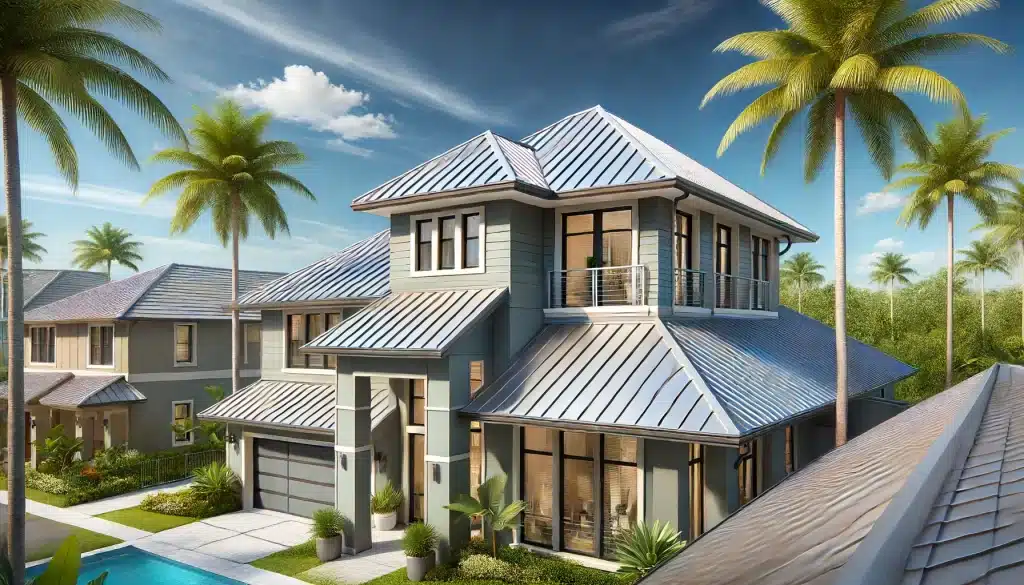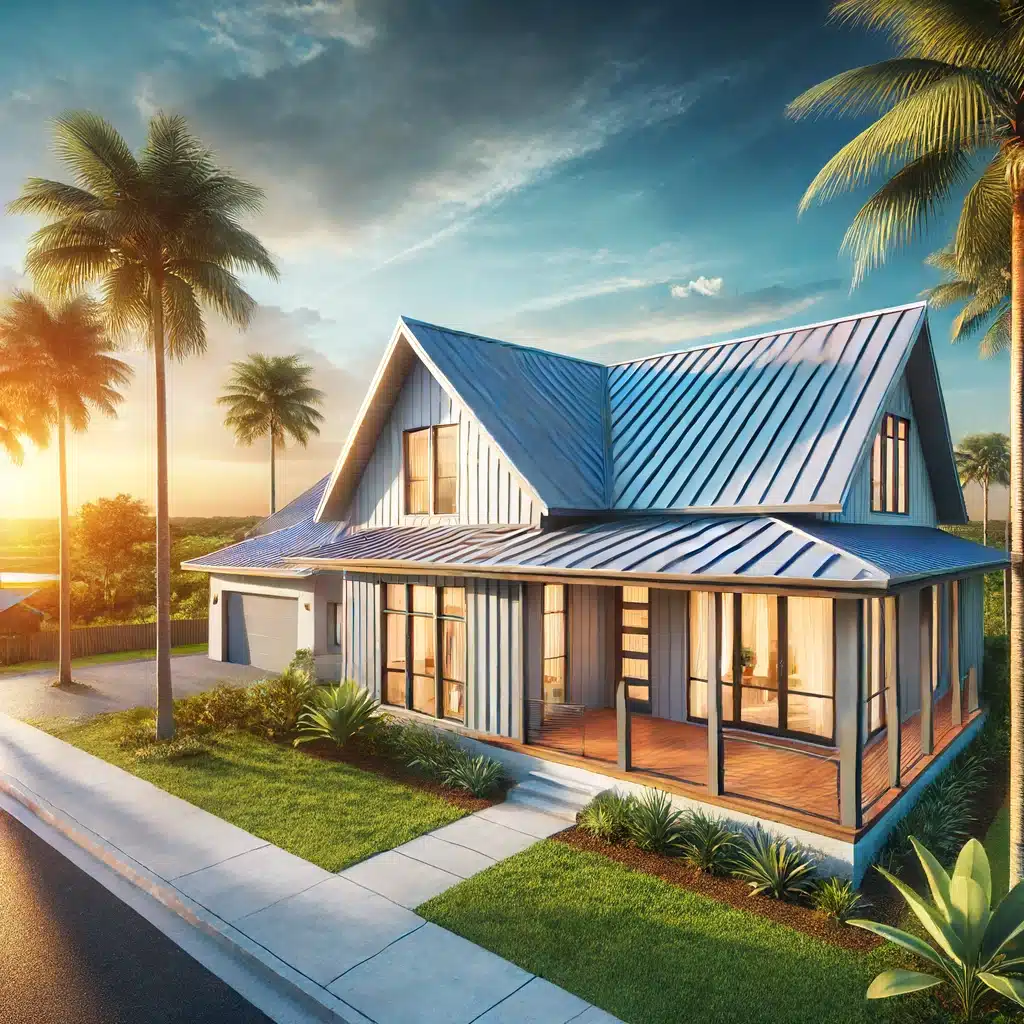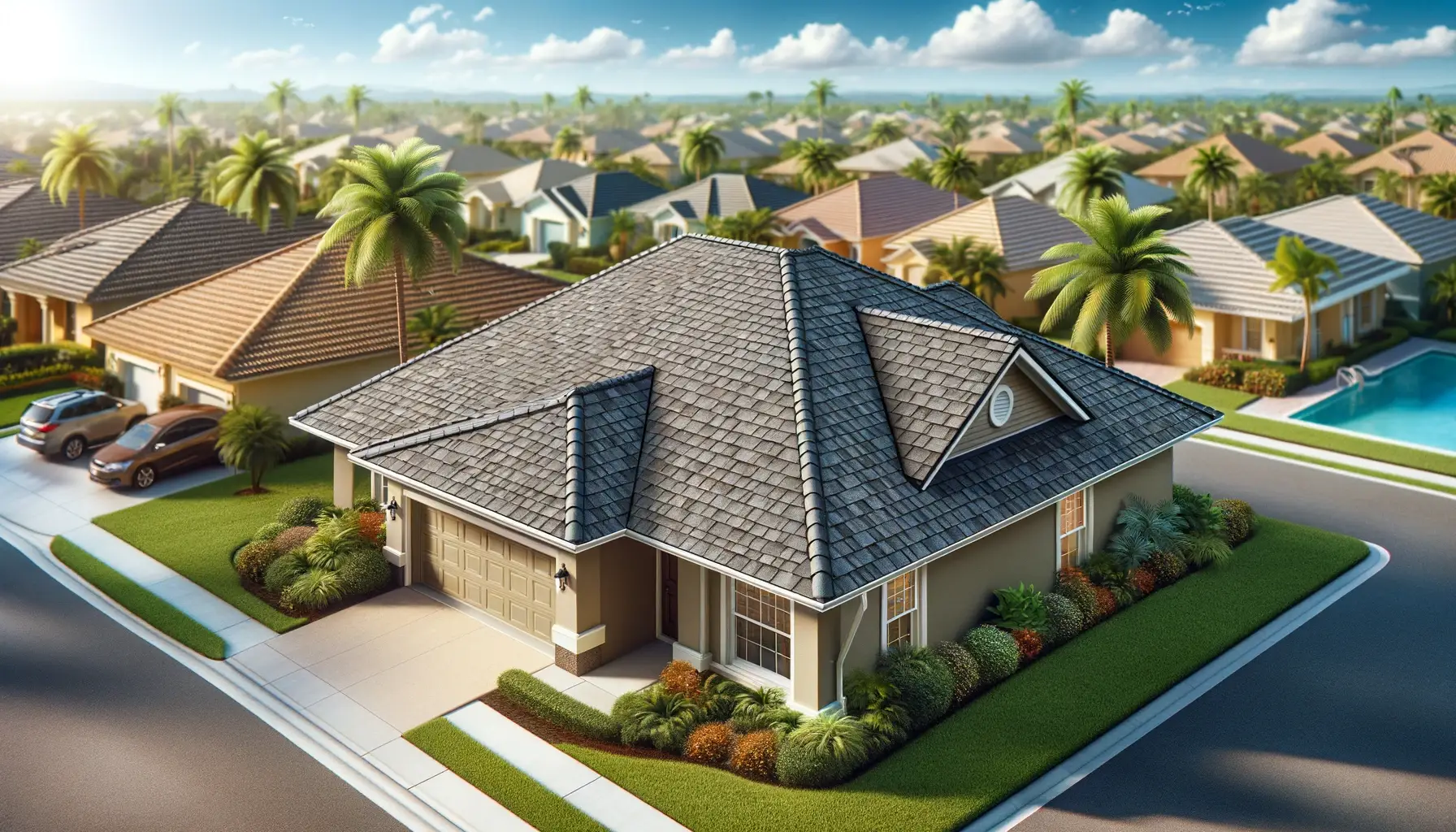When it comes to selecting the ideal roofing material for your home or business in Florida, metal roofing stands out as a top contender. Known for its durability, energy efficiency, and environmental benefits, metal roofing offers a host of advantages that make it a smart investment for property owners. In this comprehensive guide, we’ll explore everything you need to know about metal roofing in Florida, from its benefits and types to installation tips and common misconceptions.
Benefits of Metal Roofing in Florida
Durability and Longevity
Metal roofing is renowned for its ability to withstand the harsh weather conditions that Florida often experiences. From intense sunlight to heavy rain and high winds, metal roofs are built to last.
Resistance to Harsh Weather Conditions
Florida’s weather can be unpredictable, with hurricanes and tropical storms posing significant threats. Metal roofs are designed to resist wind uplift, impact from debris, and water penetration, making them an excellent choice for coastal and inland areas alike.
Lifespan Compared to Other Roofing Materials
While traditional asphalt shingles may need replacement every 15-20 years, metal roofs can last 40-70 years or more with proper maintenance. This extended lifespan translates to fewer replacements and less environmental waste.
Energy Efficiency
Metal roofs contribute to significant energy savings by reflecting solar heat and reducing cooling costs, which is particularly beneficial in Florida’s hot climate.
Reflectivity and Cooling Costs
Many metal roofing products come with reflective coatings that minimize heat absorption, keeping your home cooler during the scorching summer months. This can lead to substantial reductions in air conditioning use and energy bills.
Insulation Benefits
Metal roofs can also be installed with additional insulation, further enhancing their energy efficiency. Proper insulation helps maintain comfortable indoor temperatures year-round.
Environmental Impact
Choosing a metal roof is an environmentally responsible decision, as these materials are highly recyclable and often made from recycled content.
Recyclability
At the end of their long life, metal roofing materials can be recycled, reducing the overall environmental footprint. This is a stark contrast to asphalt shingles, which contribute to landfill waste.
Sustainable Manufacturing Processes
Many manufacturers of metal roofing products employ sustainable practices, such as using recycled materials and minimizing waste during production.
Cost-Effectiveness
While the initial cost of a metal roof may be higher than some other roofing options, the long-term savings and benefits make it a cost-effective choice.
Initial Investment vs. Long-Term Savings
The durability and longevity of metal roofs mean fewer replacements and repairs over time, which can offset the higher initial investment. Additionally, energy savings contribute to lower utility bills.
Low Maintenance Costs
Metal roofs require minimal maintenance compared to other roofing types. Routine inspections and occasional cleaning are usually sufficient to keep them in excellent condition.
Types of Metal Roofing Materials
Metal roofing comes in a variety of materials, each with its own set of benefits and aesthetic appeal. Here are some of the most popular options:
Aluminum Roofing
Advantages of Aluminum
Aluminum is lightweight, corrosion-resistant, and highly reflective, making it a suitable choice for Florida’s coastal regions where salt spray can be a concern.
Common Uses in Florida
Due to its resistance to corrosion, aluminum roofing is often used in homes and businesses near the coast. Its reflectivity also helps in reducing cooling costs.
Steel Roofing
Steel roofing is a popular choice due to its strength and versatility. It is available in several types:
Galvanized Steel
Galvanized steel is coated with a layer of zinc to protect against rust. It is a cost-effective option with a long lifespan.
Galvalume Steel
Galvalume steel combines aluminum and zinc for superior corrosion resistance, making it a durable and long-lasting roofing material.
Copper Roofing
Aesthetic Appeal
Copper roofs are known for their distinctive appearance and natural patina that develops over time, adding a unique character to any building.
Longevity and Patina Development
Copper is highly durable and can last over a century with proper care. The patina not only enhances its beauty but also provides additional protection against the elements.
Zinc Roofing
Durability and Self-Healing Properties
Zinc roofs are extremely durable and have self-healing properties, meaning they can repair minor scratches and wear over time. This makes them a long-lasting and low-maintenance option.
Cost Considerations
While zinc roofing can be more expensive upfront, its longevity and minimal maintenance needs make it a worthwhile investment.
Installation Process of Metal Roofs
Installing a metal roof requires precision and expertise. Here’s an overview of the process:
Preparing the Roof Deck
Before installation, the existing roof (if any) is removed, and the roof deck is inspected and repaired as needed to ensure a solid foundation.
Underlayment Installation
A high-quality underlayment is installed to provide an additional layer of protection against moisture and leaks.
Metal Panel Placement
Metal panels are carefully placed and aligned, ensuring proper overlap and secure attachment to the roof deck.
Sealing and Fastening
All seams and fasteners are sealed to prevent water infiltration. Specialized screws and clips are used to secure the panels without damaging the material.
Final Inspection and Quality Check
After installation, a thorough inspection is conducted to ensure the roof is properly installed and free of defects.
Maintenance Tips for Metal Roofs
To maximize the lifespan and performance of your metal roof, regular maintenance is essential.
Regular Inspections
Conduct periodic inspections to check for any signs of damage or wear. Look for loose or missing fasteners, debris, and other potential issues.
Cleaning and Debris Removal
Keep the roof clean by removing leaves, branches, and other debris that can accumulate and cause water pooling or damage.
Addressing Minor Repairs
Promptly address any minor repairs, such as replacing damaged panels or sealing small leaks, to prevent them from becoming major issues.
Professional Maintenance Services
Consider hiring professional roofing services for thorough inspections and maintenance. They can identify and fix problems that might be overlooked by the untrained eye.
Common Misconceptions about Metal Roofing
There are several misconceptions about metal roofing that can deter property owners from choosing this option. Let’s debunk some of these myths:
Noise Levels During Rain
Some people believe metal roofs are noisy during rainstorms. However, with proper insulation and underlayment, metal roofs can be just as quiet as other roofing materials.
Susceptibility to Rust
Modern metal roofing materials are designed to resist rust and corrosion. Galvanized and galvalume coatings, along with protective paints, ensure longevity and durability.
Lightning Attraction
Contrary to popular belief, metal roofs do not attract lightning. In fact, they can safely dissipate the energy of a lightning strike without catching fire.
Higher Cost than Traditional Roofing
While metal roofs may have a higher initial cost, their longevity, durability, and energy efficiency often result in long-term savings, making them a cost-effective choice.
Case Studies: Metal Roofing Success Stories in Florida
Metal roofing has been successfully implemented in various projects across Florida. Here are a few examples:
Residential Projects
Many homeowners have chosen metal roofing for its durability and aesthetic appeal. From modern designs to traditional styles, metal roofs complement a variety of home architectures.
Commercial Projects
Businesses benefit from metal roofing’s long lifespan and low maintenance requirements. Retail stores, offices, and warehouses often opt for metal roofs to protect their investments.
Community Buildings and Landmarks
Metal roofing is also used in community buildings and landmarks, providing reliable protection and contributing to the architectural beauty of the area.
Choosing the Right Contractor for Metal Roofing in Florida
Selecting the right contractor is crucial for a successful metal roofing project. Here are some tips to help you make an informed decision:
Importance of Certification and Licensing
Ensure the contractor is properly certified and licensed to perform roofing work in Florida. This guarantees they meet state requirements and industry standards.
Evaluating Experience and Expertise
Look for contractors with extensive experience in metal roofing. Their expertise can make a significant difference in the quality and longevity of your roof.
Reading Reviews and Testimonials
Check online reviews and testimonials from previous clients to gauge the contractor’s reputation and reliability. Positive feedback is a good indicator of quality work.
Requesting Detailed Quotes
Obtain detailed quotes from multiple contractors to compare prices and services. Make sure the quotes include all aspects of the project, from materials to labor.
Conclusion
Metal roofing is an excellent choice for Florida property owners seeking durability, energy efficiency, and long-term value. With a variety of materials to choose from, each offering unique benefits, metal roofs can enhance the appearance and performance of any building. Proper installation and maintenance are key to maximizing the lifespan of your metal roof. By selecting a reputable contractor and staying informed about the latest advancements in metal roofing, you can enjoy the many advantages this roofing option provides.
FAQs
How long does a metal roof last in Florida?
A well-maintained metal roof can last 40-70 years or more, making it one of the most durable roofing options available.
Are metal roofs noisy during rainstorms?
With proper insulation and underlayment, metal roofs are no noisier than other roofing materials, ensuring a quiet and comfortable indoor environment.
Is metal roofing energy efficient?
Yes, metal roofing is highly energy efficient. Its reflective properties help reduce cooling costs, making it a smart choice for Florida’s hot climate.
What is the cost comparison between metal roofing and traditional shingles?
While the initial cost of metal roofing may be higher, its long-term savings in maintenance, energy costs, and replacement make it a cost-effective option over time.
Can I install a metal roof over my existing roof?
In many cases, metal roofs can be installed over existing roofs, but it’s essential to consult with a professional contractor to ensure proper installation and avoid potential issues.




